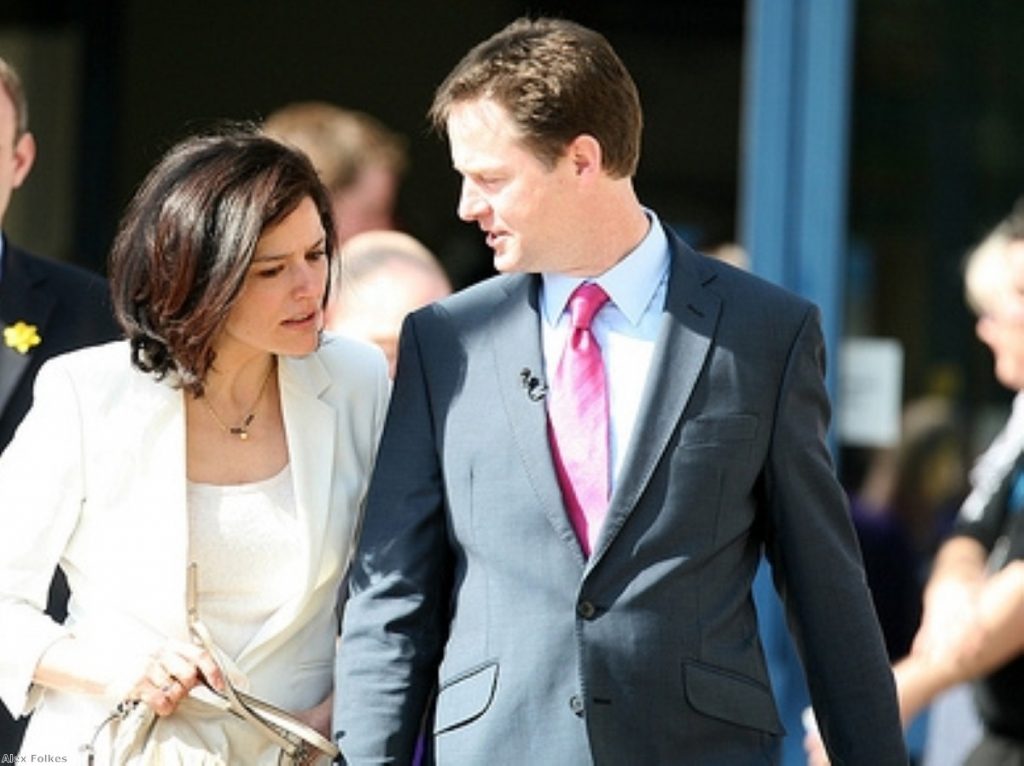Lib Dem surge changes the rules of the game
By Ian Dunt
An unprecedented surge in support for the Liberal Democrats has changed the face of the election campaign with just weeks to go until polling day.
One poll today put Britain’s third party in first place, a situation which would have been unthinkable just days ago. A separate poll put the Lib Dems in second place, while another saw them taking votes off the Tories and coming up strongly behind Labour.
With such a wide data base, the disparate surveys strongly suggest that Thursday’s leaders’ debate was a game-changing event which could impact the result of the general election, probably by taking enough votes from the Tories to secure a hung parliament.


David Cameron’s campaign relies on him taking several Lib Dem seats, something current developments are making more and more unlikely.
Earlier today, Nick Clegg said the improved polling was “only a beginning”.
A BPIX poll for the Mail on Sunday saw Lib Dem support at 32%, a point ahead of the Tories on 31% and well ahead of Labour on 28%.
The survey represents a 30% rise in the third party’s ratings in just one week.
It is thought to be the first poll to put the Lib Dems or any of their previous incarnations in first place, except for a brief spell in the 80s during the SDP-Lib Dem Alliance.
Meanwhile, a ComRes poll for the Sunday Mirror saw the Tories on 31%, just ahead of the Liberal Democrats on 29% and Labour on 27%.
An ICM poll for the Sunday Telegraph put the Tories on 34%, Labour on 29% and the Lib Dems on 27%.
It is the closest gap between the three parties in a ComRes poll since September 2003.
In all three polls, the gap between Labour and the Lib Dems is within the margin of error.
All three polls also reveal disintegrating Tory support – possibly a result of David Cameron’s disappointing performance last Thursday. The ComRes poll gives the Conservatives their lowest rating since September 2007.
A poll for the Sunday Times found the Liberal Democrat leader’s approval rating stood at 72 per cent, the highest of any UK party leader since Winston Churchill (83 per cent) on the eve of the 1945 general election.
David Cameron was on 19 per cent meanwhile, with Gordon Brown on minus 18 per cent.
All eyes are now on next Thursday’s debate. TV debates tend to have their momentum set by the opening performances, but a weak night from Mr Clegg on Thursday could turn the wave of support into a mere blip. Similarly, Mr Cameron will need to pull something special out the hat to prevent the last week turning into a trend.
Labour and the Tories adopted wholly different strategies to the Lib Dem threat over the weekend.
Labour offered something of an olive branch, with figures as prominent as Alan Johnson discussing how easily the two parties could work together in coalition.
The Labour approach is further evidence that the party recognises a Lib Dem surge damages the Tories more that it does them, and also that senior figures in the governing party would be willing to countenance a Lib Dem coalition.
Speaking on the Andrew Marr programme this morning, Mr Brown said: “People said this election was going to be a fait accompli before it started. Actually, it’s wide open.”
Asked how he would adapt to the Lib Dem threat, Mr Brown repied: “I don’t think its about tactics. Its about getting our message across.”
The Tories, whose entire electoral strategy could easily be scuppered by Lib Dem momentum, have gone on the attack.
Shadow foreign secretary William Hague told the Sunday Times Mr Clegg would install a “European super-state” if he attained any power.
“It is [Lib Dem] policy to join the euro. That is completely out of step with the majority of people in the country,” he said.
Speaking earlier today, shadow chancellor George Osborne said the party would “redouble the positive” to counter the Liberal Democrat boost.
Yesterday, Mr Cameron and Ken Clarke both warned against allowing a hung parliament. Mr Clarke said it could prompt a double-dip recession, while Mr Cameron said it would result in politicians haggling instead of concrete change.












